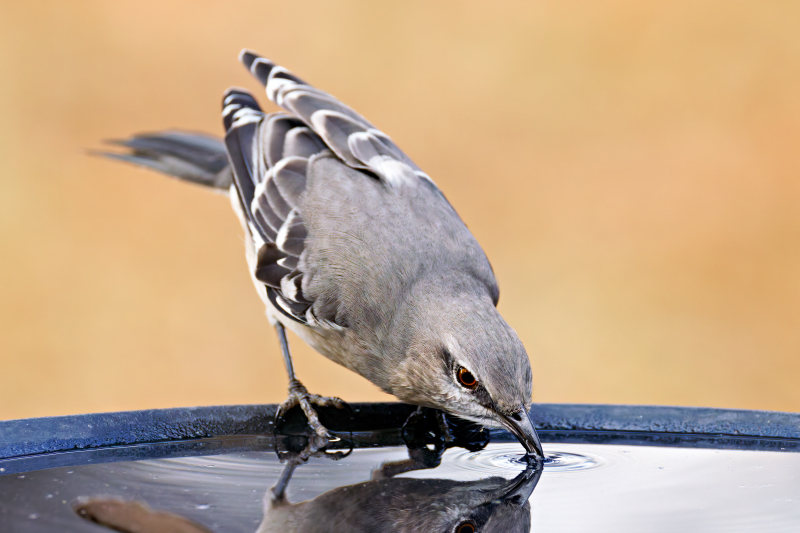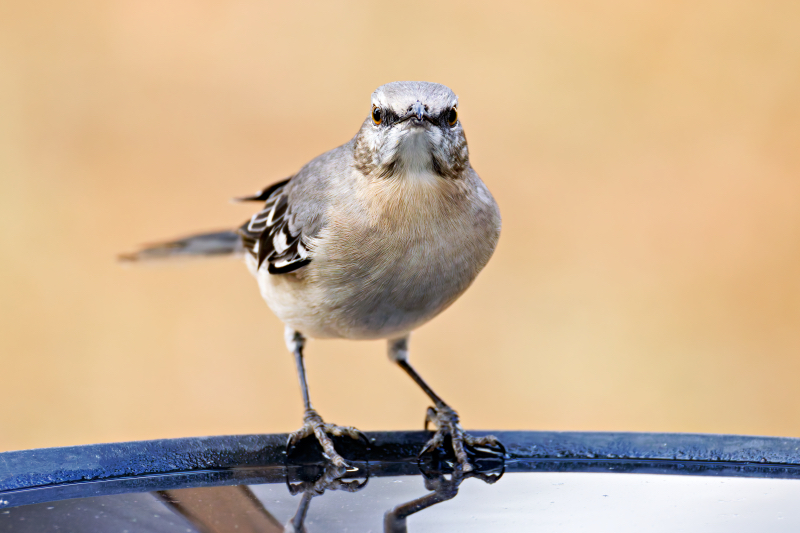Northern Mockingbirds have long been frequent visitors to my yard, and I’ve documented many of their antics over the years (see my previous posts). This fall, I’ve observed a unique behavior at my birdbath—a turf war between two mockingbirds that have claimed territories on either side of it. The birdbath has somehow become neutral ground and a hotly contested resource.
The moment one bird swoops in for a drink, the other quickly chases it off. The “intruder” barely has time to sip before being driven away. It’s amusing to watch, as the fleeing bird often manages to snag a quick drink before darting off. This territorial dance keeps me on my toes, as I have to be quick with my camera to photograph one of these birds at the birdbath. I’d love to capture the chase itself, but they’re too far apart and too fast.


Here’s what I’ve noticed and researched about their behavior and why it’s likely happening now:
Seasonal Territorial Shifts
Late fall is a time of transition for mockingbirds, and their territorial behavior reflects this:
- Reduced Aggression: Though they defend territory year-round, their territorial intensity usually decreases in fall and winter, as the breeding season ends. Yet, some defense remains, especially around vital resources.
- Adjusted Territory Size: As temperatures drop, mockingbirds may reduce their territory size to conserve energy, leading to more frequent overlap at shared resources like my birdbath.
Resource Guarding
The birdbath has become a high-value asset for these mockingbirds, especially with natural water sources drying up.
- Scarcity of Resources: With fewer food and water options available in late fall, my birdbath becomes a critical spot worth defending.
- Dietary Needs: In colder months, mockingbirds shift to a diet rich in fruits. Staying hydrated aids digestion and helps balance their diet, making the birdbath even more attractive.
Overwintering Strategy
Many Northern Mockingbirds stay in the same area year-round, defending their resources to improve their odds of surviving winter.
- Securing Water Access: By claiming the birdbath as part of its territory, each mockingbird ensures it has a reliable water source for the colder months, when natural sources may freeze or become scarce.
- Long-Term Territory: Maintaining control over this shared resource could be a way to establish dominance for the winter season, helping them keep vital resources close as conditions worsen.
Individual Variation in Aggression
Mockingbirds are known for their assertive nature, but each bird exhibits its own level of territorial aggression.
- Varying Temperaments: Some mockingbirds are naturally more defensive than others. This particular pair seems especially intent on guarding the birdbath, likely due to past success in protecting it.
- Learned Behavior: This repeated guarding behavior may stem from experience. If one bird learned that aggressively defending the birdbath worked, it’s likely to keep up this strategy.
While their territorial battles may seem intense, this behavior is a normal part of the mockingbird’s survival strategy. Their antics might decrease as winter settles in, or they may simply learn to tolerate each other’s presence at the birdbath. Either way, it’s a reminder of the adaptability and resourcefulness of these fascinating birds.